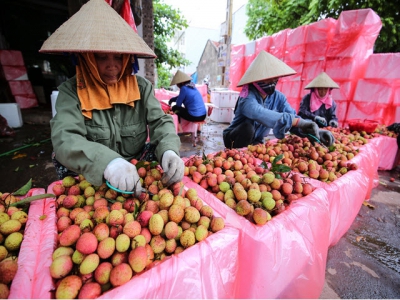Vietnam to export fresh lychee to Japan after five years of negotiation

The Japanese Ministry of Agriculture, Forestry and Fisheries (MAFF) on Tuesday sent a letter to the Plant Protection Department under the Vietnamese Ministry of Agriculture and Rural Development to announce that the direct export of fresh lychees from Vietnam to Japan has been officially green-lighted.
Workers pack Vietnamese fresh lychees. Photo: Nam Tran / Tuoi Tre
According to the Vietnamese Plant Protection Department, it will continue coordinating with businesses to soon complete preparatory work and seek partners to ship the first batch of fresh lychees to Japan in 2020.
This is the result of more than five years of bilateral negotiation, the department said.
During the period, the two sides together carried out rigorous experiments to thoroughly ensure Japan's phytosanitary requirements for Vietnamese lychee trade.
The regulation on imported plant quarantine for Vietnamese lychees, which took effect on December 15, 2019, was once again enclosed in the letter of the MAFF.
Accordingly, Vietnamese lychees exported to Japan must be grown in gardens supervised and granted area codes by the Plant Protection Department, and comply with Japan’s regulations on plant quarantine and food safety.
Exported batches must be packed and treated with Methyl Bromide at facilities recognized by the Plant Protection Department and the MAFF, with the minimum dosage of 32 grams per cubic meter for two hours under the supervision of Vietnamese and Japanese plant quarantine officers.
They must be enclosed with a phytosanitary certificate issued by the Plant Protection Department.
Before Japan, the Vietnamese fresh lychee was also exported to several Asian countries including China, Laos, Cambodia, and Thailand, as well as other demanding markets such as the U.S., the EU, and Australia.
In 2019, Vietnam shipped more than 100,000 metric tons of fresh lychees to the aforementioned markets, according to the local news outlet
Related news
 Vietnamese rice crowned best at 2019 World Rice Conference
Vietnamese rice crowned best at 2019 World Rice Conference Organic rice ST24 from Vietnam’s Mekong Delta province of Soc Trang was crowned the best in the world at The Rice Trader (TRT) World Rice Conference 2019
 Rubber exports bounce back
Rubber exports bounce back During November, rubber exports stood at over 199,000 tonnes, with a value of approximately US$262 million, an increase of 10.8 per cent in volume
 New development for rubber industry
New development for rubber industry In recent years, rubber export price has decreased. In many areas, people have replaced rubber trees by growing other crops.